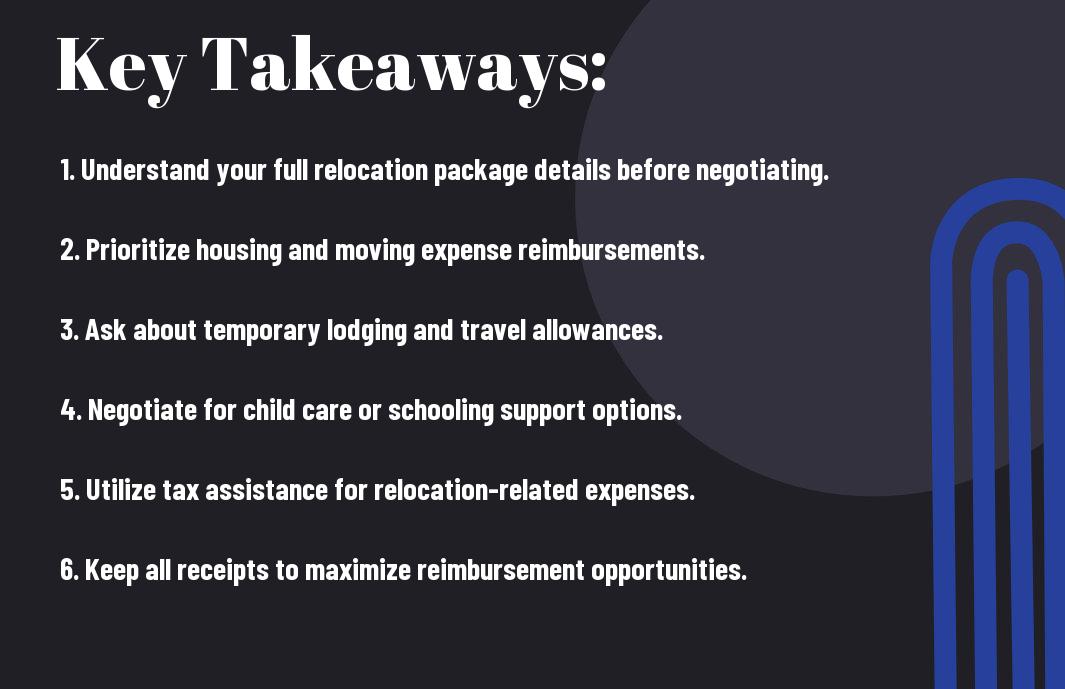You have the opportunity to enhance your relocation experience as a healthcare provider. Understanding the intricacies of your relocation package can lead to significant benefits and a smoother transition. This post will guide you through effective strategies to maximize your relocation benefits, ensuring you secure the resources you need to make your move as seamless as possible. From negotiation tips to understanding what expenses are covered, this information is designed to empower you in taking full advantage of your relocation package.


Unearthing the True Value of Your Relocation Package
Understanding the full value of your relocation package goes beyond just the salary and moving expenses. It involves a comprehensive look at every component, which can significantly impact your transition. By thoroughly analyzing your entire package, from housing stipends to educational reimbursements, you can leverage the total offering to meet your specific needs and improve your overall satisfaction with the move.
Breaking Down Package Components
Your relocation package likely includes various components such as moving expenses, temporary housing, signing bonuses, and assistance with selling or renting your current home. By itemizing each element, you can appreciate the total value more clearly. For instance, if your package offers a significant relocation bonus but skimp on temporary housing, it may influence your decision more than you think.
Evaluating Costs vs. Benefits
Evaluating the costs versus benefits of your relocation package is imperative for determining its true worth. Assess not only the upfront expenses but also consider long-term implications like changes in cost of living, tax implications, and career advancement opportunities that could arise from the move. This holistic view helps you make informed decisions about whether the package aligns with your personal and professional goals.
Consider, for example, if your new location offers a lower cost of living despite a smaller relocation bonus. Addressing your immediate moving expenses is vital, yet understanding how far your salary will stretch in your new city is equally important. A thorough financial analysis might reveal that your overall quality of life will improve significantly, making a less appealing package more attractive. Calculating potential savings on housing and everyday expenses can illuminate whether the benefits of the move outweigh any initial drawbacks. With careful evaluation, you can fully appreciate how your relocation package plays into your long-term career strategy and personal fulfillment.
Negotiation Tactics for Healthcare Providers
Effective negotiation can significantly enhance your relocation package, allowing you to secure terms that match your qualifications and experience. Being prepared with facts and figures will give you leverage during discussions. Approach the negotiation with confidence, emphasizing your unique value to the organization. Highlight your professional achievements while clearly identifying what components of the relocation package are negotiable, such as relocation costs, housing assistance, and signing bonuses.
Insider Tips for Effective Negotiation
Utilizing insider knowledge can give you an edge in negotiations. Research the organization’s typical relocation offerings and believe it’s acceptable to ask for more:
- Start your proposal with a specific number rather than a range.
- Frame your requests within context, explaining how they align with industry standards.
- Build rapport with decision-makers to create a collaborative atmosphere.
- Know your non-negotiables as well as your flexibility.
- Be prepared with alternative solutions if initial requests are declined.
Any detail can become a bargaining chip if presented thoughtfully.
Common Pitfalls to Avoid
Being aware of common pitfalls can save you from making costly mistakes in negotiation. Underestimating the value of your worth and failing to conduct adequate research leaves you vulnerable to accepting less than you deserve. Overemphasizing salary at the expense of other benefits can lead to an unbalanced package, while poor communication can create misunderstandings about your needs. Remaining passive and failing to counter offers may also prevent you from maximizing your relocation package.
A common pitfall is viewing relocation packages as a one-time deal; they are usually negotiable elements. Healthcare providers often miss opportunities by not leveraging previous offers or market research to substantiate their requests. Keep in mind that the employer is usually open to discussion, especially when they recognize the unique skills and experience you bring. Be proactive and assertive in your negotiations to ensure that you get the most out of your relocation package.
Leveraging Resources and Benefits Available
Your relocation package may include various resources and benefits that can ease your transition. Take time to review the specifics, as some employers offer financial assistance for temporary housing, transportation, and even help with settling in. Understanding these offerings allows you to plan accordingly, ensuring you utilize everything at your disposal, from job placement assistance for your spouse to local community resources that can help you establish connections in your new city.
Exploring Additional Support Services
Tax Implications and Deductions
Making the Move: Logistics and Planning
Every successful move hinges on meticulous planning and solid logistics. Take the time to create a timeline that includes all critical tasks, from notifying your current employer to setting up utilities at your new location. Engaging with professional movers can streamline the process, allowing you to focus on starting your new role without the stress of managing every detail. Make arrangements well in advance to ensure everything transitions smoothly on moving day. This proactive approach can make a remarkable difference in your overall experience and comfort level during the relocation process.
Essential Checklists for a Smooth Transition
Creating necessary checklists can help keep you organized during your move. Start with a task list that details everything from packing belongings to securing housing in your new city. Include items such as transferring health records, updating your address in relevant databases, and obtaining necessary licenses or certifications for your new position. Having these lists readily available allows you to track your progress, reduces the likelihood of overlooking important tasks, and provides peace of mind as you approach your moving day.
Timing Your Move for Maximum Benefit
Aligning your move with the right time frame can maximize your relocation package’s benefits. Ideally, coordinate your relocation with your new job’s start date, ensuring you have sufficient time to settle in without feeling rushed. If your new employer offers a specific time for reimbursement of moving expenses, consider moving during that window. For instance, many cities experience less demand for housing during the off-peak seasons, which can lead to better deals on rental properties and moving services, further optimizing your relocation investment.
Targeting a move to coincide with the end of a month can also yield financial advantages, especially in terms of rental agreements or utility setups. Many landlords prefer new tenants beginning on the 1st, and this timing may grant you leverage in negotiating lease terms, as vacancies may have built-up prior to month-end. Be aware of the potential for seasonal discounts on moving services and housing options. Additionally, initiating your move during off-peak times can provide a smoother transition with reduced competition for moving vans and rental properties, ultimately enhancing your relocation package’s overall value.
Settling In: Building Your New Network
Establishing your professional presence in a new location takes time and effort, but it’s necessary for a successful transition. Start by attending local healthcare events, joining associations, and getting involved in community services. This not only helps you make connections but also allows you to understand the nuances of healthcare practices specific to your area. Use online platforms like LinkedIn to expand your network and reach out to other professionals within your specialty.
Engaging with Local Healthcare Communities
Connect with local hospitals, clinics, and healthcare organizations to engage with your peers. Participating in local professional groups or attending health fairs can provide insight into the community’s needs. Volunteer opportunities not only establish your presence but also create a supportive network of like-minded professionals who can guide you through your adjustment period.
Finding Mentorship and Professional Growth Opportunities
Seek mentorship through established professionals in your new area. Look for workshops and seminars that focus on both clinical skills and leadership development. Many organizations host networking events designed to connect newcomers with seasoned professionals who can offer valuable advice and guidance.
Mentorship plays a pivotal role in your professional journey, especially during relocation. By reaching out to experienced colleagues, you tap into a wealth of knowledge that can significantly accelerate your adaptation to the new environment. Many healthcare institutions have formal mentorship programs where you can learn from someone who understands local medical practices and cultures. Additionally, joining specialized organizations within your field can uncover workshops and training sessions catered to fast-tracking your professional development while establishing meaningful relationships in your new community.
To wrap up
The key to maximizing your relocation package as a healthcare provider lies in thorough research and strategic negotiation. You should always evaluate the entire offer, including benefits like temporary housing and relocation reimbursement. Consider your specific needs and express them clearly to your employer. By approaching the process informed and assertively, you can ensure that your transition not only meets your professional goals but also supports your personal well-being during this significant change.




